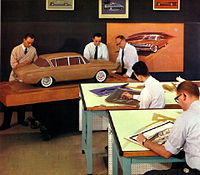
Photo from wikipedia
Can originality in real-world creative design thinking be improved through instruction and practice? Do such frequently-used measures of creative ideation as the Alternative Uses Task or Torrance Tests of Creative Thinking,… Click to show full abstract
Can originality in real-world creative design thinking be improved through instruction and practice? Do such frequently-used measures of creative ideation as the Alternative Uses Task or Torrance Tests of Creative Thinking, or other factors predict students' performance on actual industry-based design-brief challenges? Results to date are weakly promising but mixed. Here, we adopt a multi-componential view of creativity, according to which creative performance is influenced by multiple intrapersonal cognitive-motivational and environmental factors. As part of a 14-week undergraduate creative methods course, we obtained performance-based measures on several cognitive-behavioral divergent thinking tasks, together with self-report measures of personality and task-related interest. Analyses of the creative performance of 98 students who completed the creative methods course showed that (1) originality on a pre-course design challenge was predicted by a composite of performance on divergent-thinking tasks, personality, and task-related interest factors, (2) students demonstrated large and significant pre-to-post gains in originality on the design challenge and on two verbal Torrance tests, (3) gains were shown equally regardless of initial design performance. Those who started the course with lower originality scores on the design challenge gained at least as much as those who embarked with higher originality scores. These results are consistent with a multi-componential theoretical view of creativity, suggesting that a multipronged training approach, involving hands-on individual and team activities combined with explicit instruction, can markedly boost creative problem-solving capabilities. Taken together, our findings indicate that creative abilities are not fixed and can improve through training and mentoring that embraces iterative design processes.
Journal Title: International Journal of Technology and Design Education
Year Published: 2020
Link to full text (if available)
Share on Social Media: Sign Up to like & get
recommendations!